
Chungara-Revista de Antropologia Chilena
Scope & Guideline
Unveiling the Rich Tapestry of Anthropology
Introduction
Aims and Scopes
- Cultural Anthropology:
The journal explores cultural practices, beliefs, and social structures within various communities, particularly in Latin America, emphasizing the interplay between tradition and modernity. - Archaeological Research:
Chungara publishes studies related to archaeological finds, methodologies, and interpretations that enhance the understanding of pre-Hispanic and colonial societies in South America. - Bioarchaeology and Osteology:
The journal includes research on human remains, examining health, diet, and social structures of past populations through osteological analyses. - Ethnohistory and Colonial Studies:
The journal investigates the impacts of colonialism on indigenous populations, exploring historical narratives and their contemporary implications. - Environmental Anthropology:
Research on the interaction between human societies and their environments, focusing on sustainability, resource management, and socio-environmental conflicts, is a significant aspect of the journal. - Gender and Intersectionality:
Chungara addresses issues of gender, identity, and social inequalities, analyzing how these factors influence cultural practices and social dynamics.
Trending and Emerging
- Socio-Environmental Conflicts:
An increasing focus on socio-environmental conflicts, particularly in relation to indigenous rights and resource management, demonstrates the journal's commitment to addressing urgent contemporary issues. - Interdisciplinary Approaches:
There is a growing trend toward interdisciplinary research that combines anthropology with other fields such as archaeology, history, and environmental science, allowing for a more holistic understanding of complex social issues. - Health and Disease Studies:
Research examining health, disease patterns, and their socio-cultural implications is gaining prominence, reflecting a broader interest in bioarchaeology and public health. - Critical Reflections on Colonialism:
The journal is increasingly publishing works that critically assess the legacies of colonialism and their lasting impacts on indigenous populations and cultural practices. - Gender Studies and Intersectionality:
Emerging discussions around gender and intersectionality are becoming more prevalent, highlighting the need to understand how various identities shape experiences within cultural contexts.
Declining or Waning
- Traditional Ethnography:
There seems to be a decline in purely descriptive ethnographic studies, as the focus shifts toward more critical, analytical approaches that engage with contemporary issues and theoretical frameworks. - Historical Archaeology:
Research focused solely on historical archaeology, particularly studies that do not integrate contemporary anthropological theories, is becoming less frequent in favor of more interdisciplinary approaches. - Classical Anthropological Theories:
There is a noticeable reduction in the application of classical anthropological theories without critical engagement, as newer theoretical perspectives gain traction. - Local Indigenous Practices Documentation:
While documentation of indigenous practices remains essential, the emphasis appears to be shifting towards analysis of their contemporary relevance and implications rather than mere cataloging. - Cultural Relativism without Contextualization:
The journal seems to be moving away from discussions rooted solely in cultural relativism without considering the broader socio-political and economic contexts that shape cultural expressions.
Similar Journals
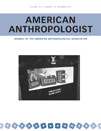
AMERICAN ANTHROPOLOGIST
Uncovering the rich tapestry of human experience.American Anthropologist is a prestigious journal published by Wiley, dedicated to advancing the field of anthropology. With a rich publishing history dating back to 1888, it has become a leading platform for scholarly discourse, showcasing innovative research and diverse perspectives from around the globe. The journal holds impressive ranks within its categories, being recognized as Q1 in both Anthropology and Arts and Humanities, alongside a notable Scopus ranking of #36 out of 502 in Social Sciences. Its robust impact in academia is reflected in its emphasis on interdisciplinary approaches that resonate within the fields of social science and humanities. Researchers and students alike are encouraged to contribute to this vital resource that continues to shape anthropological thought and practice. For those interested, the journal is tailored for non-open access, ensuring the curation of high-caliber scholarly work accessible to a wide audience while supporting the standards of peer-reviewed publications.

Disparidades-Revista de Antropologia
Empowering voices in anthropology through open access.Disparidades-Revista de Antropologia, published by CONSEJO SUPERIOR INVESTIGACIONES CIENTIFICAS-CSIC, has established itself as a vital platform for scholarly discourse within the fields of anthropology, cultural studies, and linguistics since its inception. With an Open Access policy introduced in 1996, this Spanish journal ensures that critical research is accessible to a global audience, fostering interdisciplinary dialogue and knowledge sharing. Residing in the culturally rich environment of Madrid, Spain, the journal's recent categorizations within the Q4 in Anthropology, Q3 in Cultural Studies, and Q3 in Linguistics and Language indicate its growing influence in these areas, even as its Scopus rankings reflect the ongoing challenges in enhancing its visibility and impact. Aimed at researchers, professionals, and students alike, Disparidades champions innovative approaches and diverse perspectives, making a significant contribution to the understanding of socio-cultural disparities in contemporary society. By providing an accessible forum for academic research, it plays a crucial role in advancing knowledge and scholarship across multiple disciplines.

Virajes-Revista de Antropologia y Sociologia
Connecting Scholars to Global ConversationsVirajes-Revista de Antropologia y Sociologia, published by UNIV CALDAS, is a premier open-access journal that has been at the forefront of anthropological and sociological research since its inception in 2008. With the ISSN 0123-4471 and the E-ISSN 2462-9782, this journal offers a unique platform for scholars and practitioners to disseminate high-quality research that contributes to the understanding of social dynamics and cultural phenomena, particularly in the Latin American context. The journal seeks to foster an interdisciplinary approach, bridging theoretical and empirical research, and encouraging critical dialogues on contemporary issues in anthropology and sociology. By providing open access, Virajes ensures that its valuable content is available to a global audience, thus enhancing knowledge dissemination and engagement within the academic community. With its commitment to excellence and accessibility, Virajes stands as an essential resource for researchers, professionals, and students committed to exploring the complexities of human societies.

Anthropological Notebooks
Empowering Scholars to Share Transformative ResearchAnthropological Notebooks, published by the SLOVENE ANTHROPOLOGICAL SOC, is a noteworthy journal within the field of anthropology. Established in Slovenia, this journal aims to provide a platform for scholarly dialogue and dissemination of anthropological research, fostering interdisciplinary approaches and global perspectives. Although it currently holds a Q4 quartile ranking in anthropology and ranks #421 out of 502 in Scopus, it serves as an essential conduit for emerging voices and innovative ideas in the discipline. Covering research published from 2010 to 2019 and from 2021 to 2024, the journal invites contributions that explore diverse cultural narratives and anthropological insights. Despite its limited open access options, Anthropological Notebooks remains a crucial resource for researchers, professionals, and students seeking to engage with contemporary anthropological discourse and enrich their understanding of human societies.

Cuadernos de Antropologia
Fostering Global Collaboration in AnthropologyCuadernos de Antropología is a premier academic journal published by the University of Costa Rica, Faculty of Social Sciences, that has been contributing to the field of anthropology since 1983. With its commitment to Open Access, this journal ensures that research findings are readily available to a global audience, fostering collaboration and knowledge dissemination across various regions and disciplines. Although specific metrics like H-index or Scopus Rankings are not provided, the journal's long-standing history and accessibility underscore its importance in promoting anthropological research in Latin America and beyond. Covering a broad spectrum of topics within anthropology, Cuadernos de Antropología welcomes submissions from researchers, professionals, and students, aiming to enrich the academic landscape with diverse perspectives and innovative insights. Located in the heart of Costa Rica, the journal serves as a vital platform for advancing the understanding of cultural, social, and historical contexts that shape human behavior.
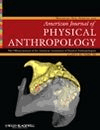
AMERICAN JOURNAL OF PHYSICAL ANTHROPOLOGY
Illuminating the Path of Human OriginsAMERICAN JOURNAL OF PHYSICAL ANTHROPOLOGY, published by Wiley, has established itself as a leading platform in the field of physical anthropology since its inception in 1918. This esteemed journal, identifiable by its ISSN 0002-9483 and E-ISSN 1096-8644, has been instrumental in disseminating groundbreaking research, achieving impressive rankings in both Social Sciences (Rank #18/443, 96th percentile) and Medicine (Rank #9/44, 80th percentile) categories within Scopus. Although its coverage in Scopus has concluded as of 2021, the journal continues to be a vital resource for academics and professionals seeking to explore the biological aspects of human evolution and variation. With a commitment to high-quality, peer-reviewed publications, the journal supports open access to enhance the visibility and accessibility of anthropological research globally. Researchers, students, and professionals are encouraged to engage with the innovative findings published in this journal, contributing to the ongoing dialogue in physical anthropology.

Social Analysis
Advancing Critical Insights in Social ResearchSocial Analysis, an esteemed academic journal published by BERGHAHN JOURNALS, is at the forefront of interdisciplinary research, focusing on the dynamic intersections of anthropology, cultural studies, sociology, and the arts and humanities. Since its inception in 2002 and having transitioned to an Open Access model in 2020, the journal ensures that critical social research is widely accessible to scholars and the public alike. With an impressive Q1 ranking in Anthropology and cultural studies and holding a notable Q2 in Sociology and Political Science, it garners attention from a large academic audience, as evidenced by its high Scopus rankings: 10th in general arts and humanities and 153rd in cultural studies. This signifies its influential role in shaping contemporary discourse and providing a platform for innovative ideas and methodologies in understanding social phenomena. Based in Brooklyn, NY, the journal is dedicated to fostering scholarly dialogue and advancing the field, making it an essential resource for researchers, professionals, and students eager to engage with and contribute to the field of social analysis.
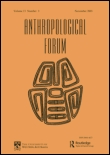
Anthropological Forum
Exploring the Depths of Human ExperienceAnthropological Forum, an esteemed journal in the field of anthropology, is published by Routledge Journals, Taylor & Francis Ltd. With an ISSN of 0066-4677 and an E-ISSN of 1469-2902, the journal has cemented its reputation for fostering critical discussions and innovative research since its inception in 1963. Covering a broad range of topics within anthropology, it has achieved an impressive Q1 ranking in the category of Anthropology and a Q2 ranking in Arts and Humanities (miscellaneous) in 2023, showcasing its pivotal role in advancing scholarly discourse. With a Scopus ranking placing it in the top 10% of its field, the journal provides valuable insights into contemporary anthropological issues, making it an essential resource for researchers, professionals, and students alike. Although not an open-access journal, the comprehensive studies and articles published within its pages contribute significantly to the academic and professional community. Addressed out of Milton Park, Abingdon, UK, the Anthropological Forum remains a seminal platform for disseminating high-quality anthropological research.
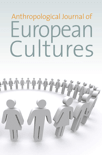
Anthropological Journal of European Cultures
Decoding the Complexity of European CulturesAnthropological Journal of European Cultures, published by BERGHAHN JOURNALS, is a premier Open Access journal dedicated to the exploration and analysis of cultural dynamics within European societies. With an ISSN of 1755-2923 and an E-ISSN of 1755-2931, the journal has been providing a platform for critical discourse in anthropology and cultural studies since its inception in 2008. Catering to a diverse readership of researchers, professionals, and students, the journal plays a vital role in fostering a deeper understanding of European cultures through rigorous scholarship. It has garnered commendable rankings, including Q3 in Anthropology and Q2 in Cultural Studies for 2023, reflecting its growing influence and quality within the academic community. The journal is committed to Open Access since 2020, ensuring that cutting-edge research is freely available to all, thereby enhancing its reach and impact in the global discourse on culture and anthropology. With its comprehensive and interdisciplinary approach, the *Anthropological Journal of European Cultures* serves as an essential resource for advancing knowledge and promoting dialogue in these dynamic fields.
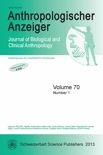
ANTHROPOLOGISCHER ANZEIGER
Connecting Disciplines for a Deeper Understanding of LifeANTHROPOLOGISCHER ANZEIGER, published by E Schweizerbart'sche Verlagsbuchhandlung, is a distinguished journal dedicated to the interdisciplinary fields of anthropology, animal science, and ecology, with a notable impact on advancing research in these areas. Since its inception in 1971, the journal has played a critical role in providing a platform for innovative research, fostering scholarly exchange, and enhancing the understanding of human and animal interactions and ecosystems. With its current quartile rankings—Q2 in Anthropology and Q3 in Animal Science and Zoology—it is well-positioned to serve as a vital resource for researchers, professionals, and students alike. Although it does not currently offer open access, the journal remains an essential asset for those looking to deepen their knowledge and contribute to ongoing discussions within these intersecting disciplines. For additional information, visit the publisher's office located at NAEGELE U OBERMILLER, SCIENCE PUBLISHERS, JOHANNESSTRASSE 3A, D 70176 STUTTGART, GERMANY.